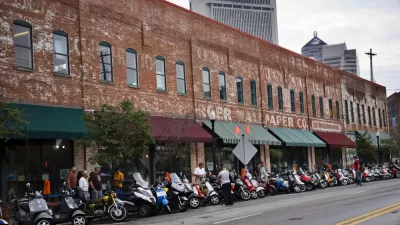A new report from the National League of Cities suggests urban areas will face diminished revenues through 2011 and beyond.
The vast majority of city finance officers reported worse financial conditions in 2010 than 2009, even as some sectors of the nation's economy have seen improvement. City revenues from property, sales and income taxes decline by 3.2%, a trend accounted for in part by decreases in housing prices.
To combat revenue loss, cities have cut spending by an average of 2.3%. Commonly employed cost-saving measures include laying off workers (79% of cities surveyed), delaying and canceling capital projects (69%), reducing health benefits (34%) and making across-the-board service cuts (25%).
Christopher Hoene, co-author of the report and director of the Center for Research and Innovation for the National League of Cities, cautions that the problem may be long-term:
'These stark numbers continue the trend we've been seeing for the past several years: lower revenue and reduced services at a time when there is an increased demand for services. Unfortunately, because of the loss in revenue, cities will face even more difficult circumstances in the months, if not years, to come.'
FULL STORY: Recession's Effects Intensify in Cities

Alabama: Trump Terminates Settlements for Black Communities Harmed By Raw Sewage
Trump deemed the landmark civil rights agreement “illegal DEI and environmental justice policy.”

Planetizen Federal Action Tracker
A weekly monitor of how Trump’s orders and actions are impacting planners and planning in America.

The 120 Year Old Tiny Home Villages That Sheltered San Francisco’s Earthquake Refugees
More than a century ago, San Francisco mobilized to house thousands of residents displaced by the 1906 earthquake. Could their strategy offer a model for the present?

Ken Jennings Launches Transit Web Series
The Jeopardy champ wants you to ride public transit.

BLM To Rescind Public Lands Rule
The change will downgrade conservation, once again putting federal land at risk for mining and other extractive uses.

Indy Neighborhood Group Builds Temporary Multi-Use Path
Community members, aided in part by funding from the city, repurposed a vehicle lane to create a protected bike and pedestrian path for the summer season.
Urban Design for Planners 1: Software Tools
This six-course series explores essential urban design concepts using open source software and equips planners with the tools they need to participate fully in the urban design process.
Planning for Universal Design
Learn the tools for implementing Universal Design in planning regulations.
Clanton & Associates, Inc.
Jessamine County Fiscal Court
Institute for Housing and Urban Development Studies (IHS)
City of Grandview
Harvard GSD Executive Education
Toledo-Lucas County Plan Commissions
Salt Lake City
NYU Wagner Graduate School of Public Service



























